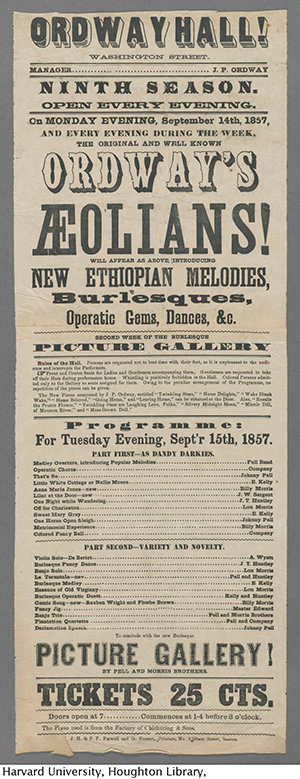Kyna Hamill did not set out to debunk a cherished local myth about “Jingle Bells,” but the truth became a runaway sleigh.
At 19 High Street in Medford, Massachusetts, a plaque commemorates the spot where James Lord Pierpont (1822–1893) supposedly wrote the popular holiday song, inspired by sleigh races on Salem Street, while sitting in a tavern in 1850. Hamill, an assistant director and senior lecturer in the CAS Core Curriculum who also teaches in the CFA School of Theatre, became interested in the “Jingle Bells” story while working as a volunteer with the Medford Historical Society & Museum. “Every December, we’d get a call asking to do a story about ‘Jingle Bells,’” she says. “I would pull out the file, and it was a very easy story to tell. Reporters loved that it was written in Medford.”
Reporters also love conflict, and so they were thrilled to learn that the Medford tale is contested by people in Savannah, Georgia, where Pierpont is buried. The southerners insist that Pierpont wrote the jaunty winter anthem in that city, in late 1857, and led the first “Jingle Bells” singalong in a local church where his brother was pastor.
“This really bothered me, that it had two narratives,” says Hamill, who has lived in Medford since earning a PhD in theatre history from Tufts. “I started digging.”

Hamill unearthed a story that is stranger than fiction: it proposes that one of America’s most popular seasonal melodies was penned by a peripatetic, perennially broke ne’er-do-well. He was the son of a New England abolitionist but shunned his father and enlisted in the Confederate army, and his virtuous wintry verses were first performed in blackface in a minstrel show. And no, Pierpont could not have written “Jingle Bells” in a Medford tavern in 1850, because in 1850, he was in California trying in vain to cash in on the Gold Rush. He did enjoy some small measure of success as a daguerreotype artist, at least until an 1851 San Francisco fire burned down his shop. He returned to Boston, broke.